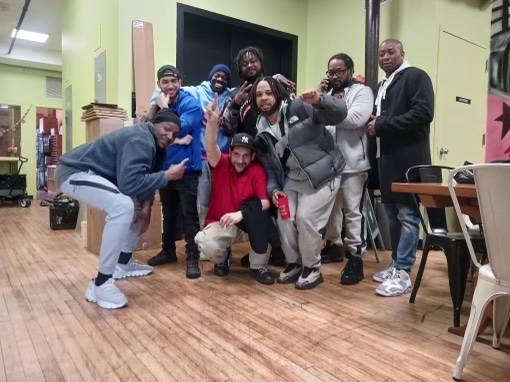by Michael Lesser
Chef Michael comes to Free Food Harlem with a diverse background in engineering, teaching, film production, as a classically trained chef and not so classically trained handyman. He brings with him a passion for the culinary arts, love of all types of food, and shares techniques to create memorable dining experiences for our Free Food patrons.
Typical NYC apartments have small kitchens. The new high-rise a group of us were living in when we first started Free Food Harlem over a year ago was no different.
I carried pots of food, potatoes, chickens, and bags of onions to distribute the ingredients for our meals to the various kitchens spread out over several floors. Soon the hallways and elevator would have that food scent that makes you hungry, like when you pass by restaurant kitchen exhaust. I crossed paths with neighbors and the building maintenance staff several times, and they all knew what day it was because of what’s cooking.
Back then we cooked our meals in three kitchens separated by fifteen floors, and when that wasn’t enough our neighbors and volunteer chefs offered up their ovens and stoves.
A group of friends living in New York working remotely for various companies, we banded together, volunteering to make a free meal for the community once a week.
We chopped vegetables, roasted turkeys, rolled Chicken Florentine, cooked chili, sweet potatoes, home baked cookies and cakes, in several small apartment kitchens, with apartment sized pots, pans, and stoves, and people working on their jobs all around us. It had the feeling of making a holiday meal for a very big family.
We were ambitious, idealist, creative, and inventive. Like the time we made beef stew for 200 people, but only had pots big enough for 50 servings. Inspired by the Campbell’s soup I grew up with, I was able to make a concentrate that could be expanded by adding water and stock later when we were at the church kitchen to serve our meal.
I didn’t know how rare it was to be serving this type of hot, homemade farm-to-table meal for free in the inner city. To give people space to sit down at a table adorned with flowers, tablecloths, napkins, and be served, with time to linger, chat, get seconds and a meal to go.
I remember the first time we served over 100 meals. That felt huge! It wasn’t long after that we were approaching 200 meals served in one night. I remember my surprise and delight when I walked out of the kitchen to see a long line through the dining room and up the stairs.
What a difference a year makes. We now serve more than 500 meals a night and cook in a spacious commercial kitchen with two floors of ovens, stoves, industrial sized pots, and all the equipment needed at our fingertips. We always intended to make more meals and feed more people, but something unexpected also happened. The face of Free Food Harlem, from the people preparing the food to those seating and serving the meal has drastically changed.
Through partnerships with two of the largest transitional communities in NYC, Exodus Alternatives to Incarceration and Housingworks, how we prepare our meal, what we do, and what we look like is so different than a year ago.
Our intern from Housingworks shows up early to head up the prep session. He gathers cutting boards and knives and arranges them for the Exodus program participants. I demonstrate to the intern how we will chop our vegetables, cut the chicken, or whatever else will be needed for the meal.
There are two, then three, and finally four of us in the commercial kitchen space rented for us to prepare our meals. One intern is from a partnership with a transitional housing community, one volunteer from a neighborhood transitional program, one from the ad we post each week to solicit for volunteers, and a kitchen assistant who moved from the West Coast to help. It takes a village to feed a community. NYC is a complicated village.
Our intern is learning basic kitchen skills which he will in turn explain to the army of prep helpers from Exodus who roll in to help us prep every Friday morning. When Exodus shows up, everybody knows it. They are a diverse, close-knit group united by purpose to be contributing members of their families and the community. It’s a high energy, all-hands-on-deck power hour of wise cracking, talking smack, teaching, and correcting each other’s chopping and prep skills. We are a diverse group of people gathered in this kitchen to make this meal who likely would have no reason to have met otherwise.
It’s also another way that Free Food has changed and evolved to a place of learning basic kitchen skills and also teamwork and valuable relationship skills needed in life.
Each person brings with them their particular flavor of knowledge, experience and skill, and freely offers it in service to this meal and to this community. I can’t ask for anything more than that, and I get to feel the deep pride when the interns and volunteers I’ve trained produce a beautiful meal.
We’ve shifted from a group of people making food for the local underserved community, to a group that is the community.

 Get access to the monthly Rehumanization Magazine featuring contributors from the front lines of this effort—those living on Death Row, residents of the largest women’s prison in the world, renowned ecologists, the food insecure, and veteran correctional officers alike.
Get access to the monthly Rehumanization Magazine featuring contributors from the front lines of this effort—those living on Death Row, residents of the largest women’s prison in the world, renowned ecologists, the food insecure, and veteran correctional officers alike.